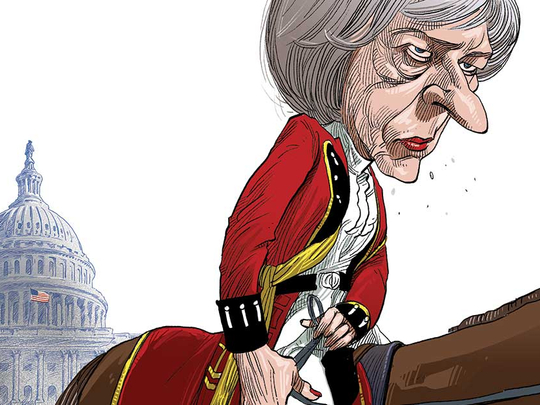
In normal times, you’d say everything went swimmingly. Sure, the American President, Donald Trump, seemed a tad unsure how to say the name of his guest — whom he greeted as Ter-raiser – slightly reinforcing the White House’s earlier failure, in a briefing note, to spell the British prime minister’s name correctly, dropping the “h” and thereby suggesting Trump was about to receive Teresa May and not Theresa May. But other than that, Prime Minister May would have been delighted.
In the press conference that followed their Oval Office meeting, there were no bombshells: Trump managed to get through it without insulting an entire ethnic group, trashing a democratic norm, or declaring war, any of which might have diverted attention from May’s big moment. He was on his best behaviour, diligently reading the script that had been written for him, attesting to the “deep bond” that connects Britain and the US. May received all the assurances she craved that her country’s relationship with the US remains “special”.
But these are not normal times and therefore while May and her team will be pleased with the optics and indeed some of the substance — artfully, May got Trump to confirm, on camera, that he is “100 per cent behind Nato” — the underlying truth is that this dash to Washington was mortifying.
First, there was the unseemly haste. May’s eagerness to be the first foreign leader to shake that short-fingered hand, the scramble to catch up with the former leader of United Kingdom Independence Party, Nigel Farage, and British Conservative politician Michael Gove, gave off a strong whiff of desperation. That is a scent Trump understands. What he lacks in book smarts, he makes up for in alpha-male gamesmanship. His lifelong training was in real estate, an area in which there is rarely such a thing as a win-win deal: The more you get, the more I pay. He will have seen May as that most desperate of creatures: The housebuyer who rashly sold her old house before she had found a new one. Having tossed away Britain’s keys to the European single market, she will soon be homeless — and Trump knows it. For all the niceties — May’s shrewd deployment of a royal invitation for a state visit and her compliment to the president on his “stunning election victory”, flattery which saw Trump glow a brighter shade of orange — he will have seen May as one who needed to make a deal. And he will look forward to naming his price.
What would such a deal look like? Tariffs between the US and the UK are already low, so it’s the dropping of a different kind of barrier that Trump would be after. That could be a softening of the food standards that have kept out hormone-injected US beef. Or granting access to the National Health Service to over-charging US drug companies. Or a relaxation in environmental or labour rules that, set with Britain’s one-time European Union partners, proved too onerous for US firms until now.
A new deal
When Trump demands all that, May — needing a deal, any deal, to prove that Brexit is not a disaster — will struggle to say no. And what would be gained? One study, released on Friday, estimated that leaving the single market will bring a loss in UK trade of up to 30 per cent — while a new deal with the US may boost it by a meagre 2 per cent. It was a reminder that while the US might be a bigger market for British exports than any other single country, it is dwarfed by the European continent on Britain’s doorstep.
And the losses will not just be economic. What can Britain’s other allies — Europeans, chiefly, but not only them — make of May’s rush to stand with Trump?
Contrast Britain’s headlong dash to Washington with German Chancellor Angela Merkel’s wariness to cosy up to a man who says torture “absolutely” works and who regards climate change as a “hoax”. In its determination to be Trump’s new best chum, Britain risks being tarred with his brush, becoming a mini-me to a man already regarded as a global danger.
Underpinning May’s approach was a kind of optimistic naivety tinged with arrogance, the same sentiments that mistakenly informed so many Republicans in their dealings with Trump during the last year: The belief that they could tame him and that he would change. Whitehall believes May can steer Trump towards sanity on the importance of the United Nations, Nato and a rules-based international system as well as the necessity of vigilance when it comes to Russian President Vladimir Putin. (“Engage, but beware,” as May put it.) As Jeremy Shapiro, a former US State Department official, told the New York Times, London tends to think “our expert tutelage will socialise him and it’ll be OK”.
Hubris apart, such thinking woefully misjudges Trump. He has not changed, and is not likely to, as the lies and lunacies so far have shown. What’s more, it assumes that Trump could ever be led to some kind of steady, consistent world view. He managed it for a few short minutes on Friday.
But the evidence suggests Trump tends to agree with the last person he speaks to. But give it a few days or weeks, and he’ll happily say the exact opposite. He’s feeling special about Britain and “Ter-raiser” now, but just wait till he gets in a room with the one person for whom his admiration has been constant: Putin. Then we’ll see which relationship Trump sees as really special.
— Guardian News & Media Ltd
Jonathan Freedland is a senior columnist. He also presents BBC Radio 4’s Contemporary History series. Freedland has published eight books, including six bestselling thrillers.












